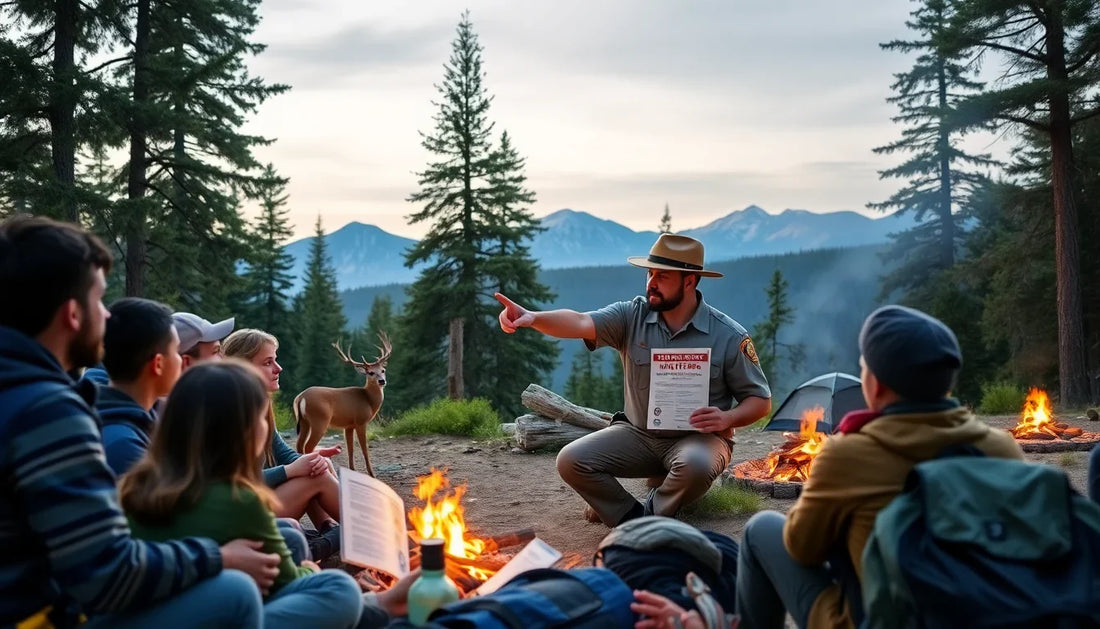
Wildlife Safety While Camping: How to Handle Bears, Snakes, and More
Share
As the sun dips below the horizon, the tranquil sounds of nature fill the air - the gentle rustling of leaves, the distant call of a lone owl, and the crackle of the campfire. For many, the allure of camping lies in the opportunity to immerse oneself in the great outdoors, to disconnect from the hustle and bustle of everyday life and reconnect with the natural world. However, with this immersion comes the responsibility of understanding and respecting the wildlife that calls these landscapes home.
At GlowCamp, we believe that a successful camping adventure is one where you can fully embrace the beauty of the outdoors while prioritizing your safety and the well-being of the surrounding ecosystem. That's why we've curated a collection of functional camping gear designed to enhance your comfort and mindfulness, allowing you to focus on the joys of the wilderness without compromising your security.
In this blog post, we'll delve into the essential wildlife safety tips every camping enthusiast should know, from navigating encounters with bears and snakes to safeguarding your campsite from smaller critters. By arming yourself with knowledge and the right gear, you can embark on your outdoor adventures with confidence, ensuring that your time in nature is both exhilarating and safe.
Understanding Bear Behavior and Avoiding Encounters
Bears are undoubtedly one of the most awe-inspiring and potentially dangerous wildlife you may encounter while camping. From the majestic grizzly to the elusive black bear, these powerful creatures command respect and caution. The key to staying safe is to understand their behavior and take proactive measures to avoid confrontations.
First and foremost, familiarize yourself with the signs of a bear's presence, such as tracks, scat, or scratches on trees. Be especially vigilant in areas known to be bear habitats, such as dense forests, berry patches, or near sources of water. When hiking or moving through the campsite, make noise to avoid surprising a bear, and keep your food properly stored and away from your sleeping area.
In the event of a bear encounter, remain calm and avoid sudden movements. Back away slowly while facing the bear, and do not turn your back or run. If the bear appears aggressive, stand your ground and use bear spray if necessary. Remember, bears are generally more interested in your food than in you, so taking the appropriate precautions can go a long way in preventing potentially dangerous situations.
Navigating Snake Safety
While bears may grab the headlines, snakes can also pose a significant threat to campers, especially in certain regions. Familiarize yourself with the venomous snake species common to the area you'll be visiting, and learn how to identify them. Snakes are generally shy and prefer to avoid human interaction, but they may strike if they feel threatened or cornered.
When hiking, stay on marked trails and be mindful of where you place your hands and feet. Avoid reaching into areas you can't see, such as under rocks or logs, and always check your shoes and sleeping bag before use. If you do encounter a snake, slowly back away and give it a wide berth. Avoid attempting to kill or capture the snake, as this increases the risk of a bite.
In the unfortunate event of a snake bite, it's crucial to remain calm, immobilize the affected limb, and seek medical attention as soon as possible. Carry a well-stocked first aid kit that includes compression bandages and antivenom, if appropriate for the region. Knowing how to respond quickly and correctly can make all the difference in a snake bite emergency.
Safeguarding Your Campsite from Smaller Critters
While bears and snakes may be the most formidable wildlife you'll encounter, your campsite is also susceptible to visits from smaller, but no less persistent, creatures. Raccoons, skunks, and even mice can be drawn to the scent of food, and their presence can quickly turn a peaceful camping trip into a nuisance-filled nightmare.
To prevent these unwanted guests, be diligent about storing your food properly. Use bear-proof containers or hang your food from a tree, well away from your tent. Avoid leaving any crumbs or spills around the campsite, and be sure to clean up after meals thoroughly. Additionally, consider using a camping lantern or other light source to deter nocturnal visitors, as many animals prefer to avoid well-lit areas.
If you do encounter smaller wildlife, resist the urge to feed them or approach them. These animals may appear cute, but they can quickly become aggressive or even dangerous if they associate humans with food. Instead, observe them from a safe distance and enjoy the opportunity to witness these creatures in their natural habitat.
Emergency Preparedness and First Aid
No matter how well you plan and prepare, the unpredictable nature of the great outdoors means that you should always be ready for the unexpected. Equip yourself with the essential safety gear, including a well-stocked first aid kit, a reliable communication device, and emergency contact information.
Your first aid kit should include items like bandages, antiseptic wipes, pain relievers, and any necessary medications. Additionally, consider including specialized items like snake bite kits or bear spray, depending on the region you'll be visiting. Familiarize yourself with the proper first aid procedures for common outdoor emergencies, and don't hesitate to seek professional medical assistance if the situation warrants it.
In terms of communication, ensure that you have a reliable way to call for help in case of an emergency. This may include a satellite phone, a personal locator beacon, or a device with a strong cellular signal. Make sure to share your itinerary and expected return time with friends or family, and establish a plan for regular check-ins.
Embracing the Wilderness with Respect and Awareness
Camping is a unique opportunity to immerse yourself in the natural world and forge a deeper connection with the environment. By prioritizing wildlife safety and respecting the delicate balance of the ecosystems you visit, you can ensure that your outdoor adventures are both thrilling and responsible.
Remember, the animals you encounter are not merely obstacles to be avoided, but rather integral parts of the landscapes you're privileged to explore. Approach every wildlife interaction with caution and reverence, and do your part to minimize your impact on the surrounding habitats.
With the right knowledge, gear, and mindset, you can navigate the wild with confidence and create lasting memories that celebrate the beauty and wonder of the great outdoors. So pack your bags, lace up your boots, and embark on your next camping adventure, secure in the knowledge that you're prepared to handle whatever wildlife encounters may come your way.
